By Wafa Syeda
On Monday, Mar.1, Puneet Aujla stood at the top of a ski hill at Blue Mountain Resort, ready for his run. His wife, Manreet, stood next to him. They both took the day off from work to celebrate his birthday, a break they desperately needed after the week they had.
Around noon, just as he was about to sit on the ski lift, he received a call. It was from the Bereavement Authority of Ontario (BAO).
For the past year, as the pandemic raged, he would juggle the needs of grieving families with the rules of the pandemic. In a time where a pandemic runs the world, funeral homes had to change their dynamics. Families were asked to choose wisely, because only 10 may enter. But all it took was just one bad day, for chaos to wreak within the walls of Brampton Crematorium.
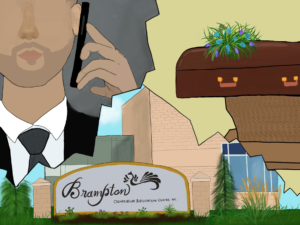
People parked on the streets, used exits to enter, and at one point there were 10 people. But then the 10 turned into 20, 20 turned to 30, and within minutes it was a mass gathering of about 60 people.
The BAO had informed him that due to the conditions of the event that took place on Feb. 27, his license would be temporarily suspended, and the funeral home would be temporarily shut down.
“It broke me down,” said Aujla. “I wasn’t working out for two-three weeks, I wasn’t eating right for two-three weeks, I just got back into my rhythm this week.”
They were to face a two-week suspension that started on Mar. 15, giving the home time to let families coordinate their funerals elsewhere.
“Reflecting back at it, I do see things that were in my hands to control as well”
Puneet Aujla
“Reflecting back at it, I do see things that were in my hands to control as well,” said Aujla. “The doors should have been locked. That call should have been made with me when soon as I got wind that there were more than the 10 plus people.”
“To the credit of this funeral home in the instance we are talking about, when we invoked the suspension and told them about it, they immediately agreed to the suspension,” said David Brazeau, from the BAO. “They did not challenge it. Which is the right of any funeral establishment to file an appeal of any order that’s given by the authority, and they did not. They agreed right away. So, I think that showed on their part, how seriously they took this.”
What happened?
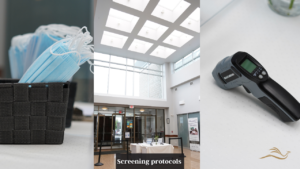
Screening protocols upon entry of the funeral home (Photo courtesy Puneet Aujla) 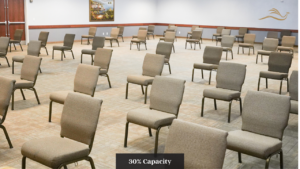
30% capacity for indoor funeral service (Photo courtesy Puneet Aujla) 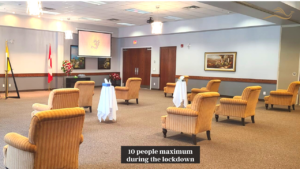
Indoor seating arrangements for a maximum of 10 people (Photo courtesy Puneet Aujla) 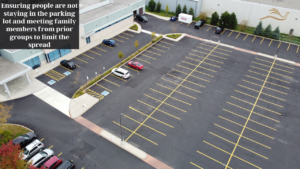
Parking lot during pandemic (Photo courtesy Puneet Aujla)
In the past eight years, Aujla’s journey began with cleaning washrooms, taking out the garbage, and mopping floors of the home, and made his way up to General Manager and licensed Funeral Director.
This funeral home is a family business, which means some of his colleagues and staff are his relatives. They are focused on helping families plan funerals, but that week they had another funeral to plan. A funeral of one of their own.
Aujla received a phone call that his maternal uncle had passed away the earlier same week. Being in the funeral industry for eight years, he thought he was somewhat immune to death, but family is family, and his uncle’s death was a sudden shock.
“We were sort of starting to grieve and we did things quite quickly,” said Aujla. “It did throw us off our game.”
Soon after, a prominent, high-profile individual from the Sikh community had died the same week, which raised some alarms in Aujla’s mind, worried that more people would like to attend than the COVID limit allows for gatherings.
Aujla and his staff were made aware that some local sources and radio programs had publicized this funeral as a ‘public visitation’, and although they got that fixed, he was worried that not everyone was aware of the change.
Placing one staff member at the front of the parking lot and another in front of the doors, they were soon to find out that it just was not enough.
“When you have 10, plus 15, 20 people walking in at one time, that one person cannot stop those people,” said Aujla. “It got out of control.”
The errors made on Feb. 27 had not only put the attendees in danger but also the staff.
“It was a lot of stress. A lot to handle. A lot of embarrassment.”
Puneet Aujla
That day consisted of 10 recorded speeches and a fair share of technical difficulties.
“The rules are the rules, I am not here to deny any of that,” said Aujla. “We know what went wrong. We know how to improve it, and we know how to stay super firm to make sure nothing like that happens again.”
Running a funeral home in the pandemic
Funeral homes are high-risk environments for transmission of COVID-19. Travelers come from abroad, people are crying, using tissues, and finding comfort in hugs.
Aujla is trained to help families deal with grief, but because of the pandemic, he is forced to follow the rules that sometimes leave the grieving in more grief than when they came. While he knows that it is for their safety, it is not as easy to explain that to someone who lost their loved one.
In the various funerals they conducted since the beginning of the pandemic, getting families to cooperate with the COVID restriction was a struggle.
“We had families that got very aggressive with us. Got very heated with us. They didn’t believe us. Maybe thought we were making the rules up.”
Puneet Aujla
They had come across a situation where an upset family was trying to bring in more people than they were allowed. Aujla said that an individual from that family almost became physical.
His cousin, Jitinder Bal who is the Operations Manager said that they had to close their doors, put up pylons and fences, to restrict people from coming in.
“We had blocked off our parking lot and somebody drove over the barricades and pylons that we had stopping them, even though we had advised them that there was no way they were gonna be able to attend the service,” said Bal. “At that point, we did have to inform the authorities.”
When asked about frustration and anxiety, Bal took a deep breath, laughed, and said, “Yah!”
“Those kind of come with the nature of the industry, the pandemic hasn’t helped,” Bal said.
“We have had to say no. A lot of the time, still till today, we are still saying no. That is tough. Definitely, we have had to say no a lot this year, for public safety,” said Aujla. “That’s part of the job to say that, but the stress aspect or taking that on is a completely different component.”
